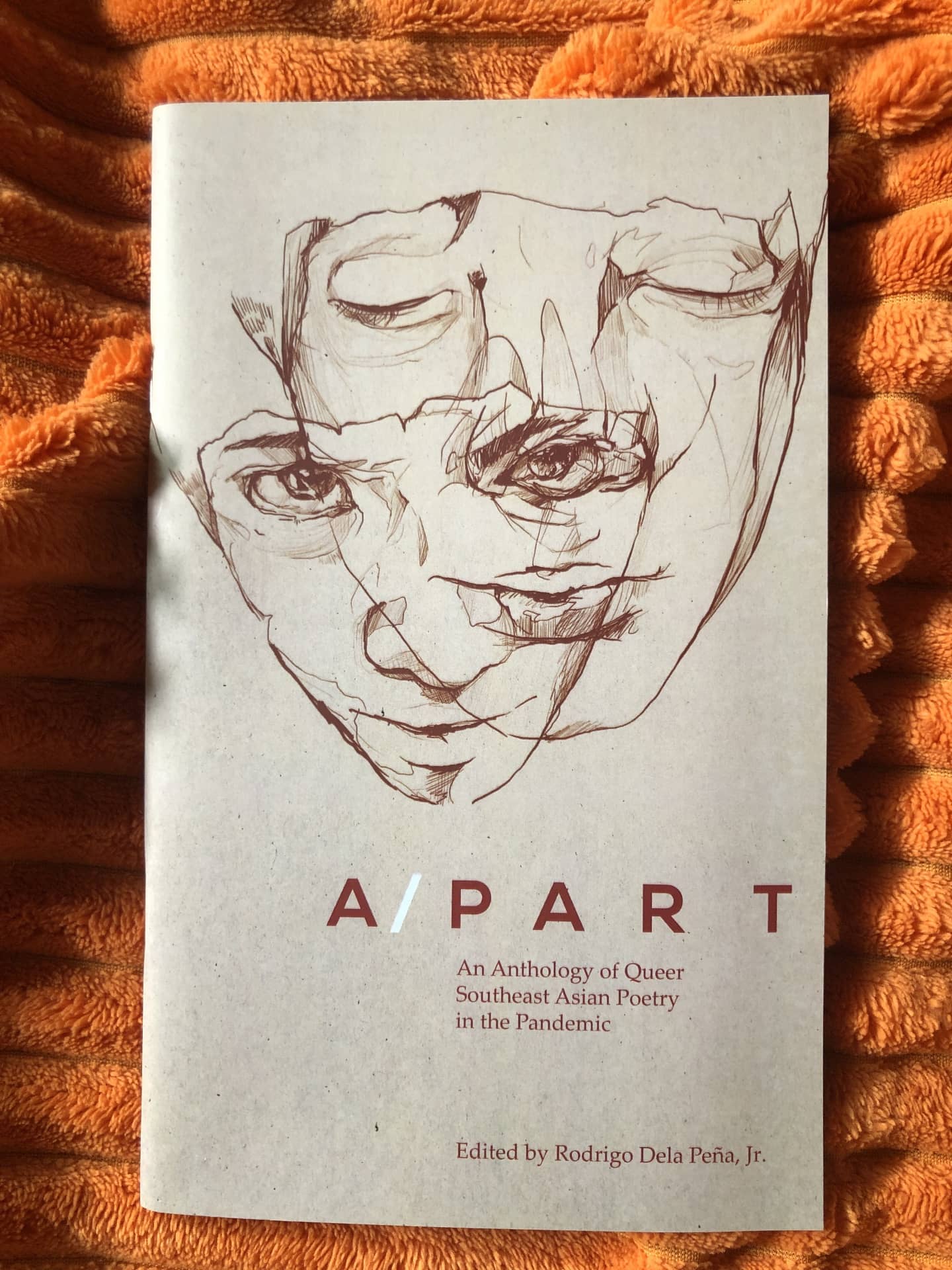Book Review: Apart yet Together

A/PART: An Anthology of Queer Southeast Asian Poetry in the Pandemic (2021, SEACQF)
-
apart.
-
(adv.) distance, away, separate units, exclusion, into pieces
(adj.) isolated, divided
Apart connotes distance, isolation, separateness, and exclusion. From the Merriam-Webster Dictionary alone, the word exists to describe our lived experiences in the middle of the coronavirus pandemic. We have been living for two years now in the middle of lockdowns, health protocols, virus surges, and quarantines. Many of us had dear friends and family dying in the middle of this crisis. Separation birthed an illusion of connectedness, finding ways to contact and catch up with each other through virtual platforms. Gay romances have become a staple source of escape in streaming sites like YouTube and Netflix. Dating and lusting have become more careful and adventurous than ever (with masks on of course!). The world has never been the same since 2020. Our queer lives have become apart yet we continue living our desires everyday.
Wittingly though, the word becomes the title for an anthology of Southeast Asian Poetry in the Pandemic, called A/PART (2021, published by SEACQF). For its editor Rodrigo Dela Peña, Jr., the slash “expresses the tension between isolation and interconnectedness, between estrangement and intimacy--a tension that we’ve felt keenly during the pandemic.”
It may well be the metaphor for a face mask, a barrier, and a border. Yet, it may also visually symbolize the possibilities of meaning in the liminal state of affairs, the uncertainties that we experience everyday or those moments when we come to terms with existential crises, who we are, why we are here, and how do we continue desiring as bodies. It attempts to make meanings in the 16 poems included in A/PART.
The poets grappled with meaning and images, with statements and queer lives. In this anthology, the idea of queer is being challenged, represented, and commented on in an age where restrictions to sexual freedom are heightened and where violence against queer individuals are constantly being called out in Twitter. Victims come out in the middle of a pandemic and they cancel out their perpetrators. How do queer identities navigate through this vulnerable and volatile spaces? Twitter also became an avenue where alter and onlyfans accounts have been used for porn and business. How do queer identities desire in such virtual platforms?
The anthology, well-curated by Dela Peña, Jr., gives a glimpse to the different lives that queer identities experienced in Southeast Asia. At times, the virus becomes a commentary on the movement of desire where we as a human race have “autoproduced/ a thousand distances from ourselves/ from techno-virality planes: Intensities” (Lune Loh, “Desiring-Virology”). We view distances from where we are, the waterways and seascapes, where natural disasters like typhoons happen alongside the coronavirus crisis. We make sense of that “wall of wind” which swept “across the globe” and began the doom of humanity (Nerisa del Carmen Guevara, “Natural Disasters”). Or perhaps, lose sleep from doomscrolling over news and fleeting, like a butterfly from one siren to another, where there is no journey to home, but perhaps to merely arrive at the home screen after reading traumatic and devastating stories (Andrew Kirkrose, “Doomscroller’s Duplex”). There were also times where we realize that lockdowns and staying at home reduced the volatility of contact between cisgender, transgender, and genderqueer individuals. One such joke in the anthology even said “they can’t misgender/ you if you don’t go outside in the first place” and another story in this stand up comedy tells of how the persona realizes,
“... /and the joke
I tell is that I never came out because it was hard enough
explaining what bisexual meant/ that this is the longest I’ve gone
without explaining myself/ the premise being, what does anyone
have to prove to anyone in a pandemic/ wait what was i
supposed to prove in the first place?” (Stephanie Dogfoot, “This Joke I Tell”)
When a new normal came to be the norm, it brought forth changes to perceptions on individual agency, coming out, and gender identity. Hierarchies are toppled down and much importance are now given to acceptance, cooperation, and authenticity. The individual and the personal becomes a heightened source of narrative for many poets. One queer persona shows through fragmentation a personal take on coming out as a pêđê (queer in Vietnamese) in crawling out of a stream in Vietnam, defying what the persona’s mother did before, to flee and hide behind a stream after experiencing domestic violence from her husband (“Bed” by Nguyen-Vu Viet Anh).
There were also commentaries such as a nonbinary and genderfluid persona, who in nostalgia, connects the virtual Pride Marches to the failed government response on SOGIE equality and the pandemic in the Philippines (“Rainbow” by Jose Luis Pablo), or a 50-year old lesbian mother longing and concerned for her child in the middle of a pandemic and realizes how experiences are so non-refundable (“Joy, On Your 50th-” by Jhoanna Lynn B. Cruz).
Other emerging poets discourse that love is more than sex (“Sa Dating Tagpuan” by Steno Padilla), that a queer hopeless romantic expresses and experiences love only in the safe harbours of their beds but never in public (“Haven” by Kendrick Loo), and that watching two boys kiss on a Thai Boy’s Love series can mean the gravity between tongues of lovers (“Boy’s Love” by Eroheizst). Two poets meditate on the loss of lovers as a dead lover remembered in music (“Loss, Desire, and Missed Things” by Desmond Kon Zhicheng-Mingde) and as memories of bondage on beds, picking up whatever is left of his lover (“2019 Might As Well Have Been a Lifetime Ago” by Fajar Zakhri).
There are also the explicit poets who never held back their love for pornography and vulgar expression, describing scenes in gay porn, voyeurism on alter worlds and only fans sites, and experiences in BDSM (“Penisillyn for Quarantine” by Aeoald Xerne Beuel”, “Big Top” by Ng Yi-Sheng, and “Anathema” by Miguel Barretto Garcia). They are witnesses to how gay desire is expressed even in isolation and a testament to the possibilities of creativity in modern expression utilizing blanks and gaps in spaces.
The anthology ends with a poem about the world that we have today, an occluded or blocked world, which philosophizes on trust, suffering of others, prophets, apparitions, and virgins. In the poem itself, the Mark Anthony Cayanan comments on the effect of the coronavirus on our lives as queer individuals, “Pathogens like doomsday prophecies can drive us to faith or premature annihilation.../ Disappointment, how god’s gentle reprimands have death tolls, if the prophet loved,/ They spread love with the fairness of the indifferent, though we crave unearthly justice/ We need mercy.../ We’ve tried and tried to restore ourselves, flung prayers to the world in regular despair/ Though the world mimics the evil in us, each other we shoulder and, hollow, hollow” (“Occluded World” by Mark Anthony Cayanan).
The hollowness, the gaps in meanings and spaces, the blackout poetry, the blanks, the interstices, the in-betweenness, and the liminality of each poem represent the overall design of the A/PART anthology. These are poems that touch on our lives, of our living present, 2020 and 2021, the brave new worlds we are now facing today. To speak about isolation, the poems invite us to quietly embrace the separation in order to see new light in these cerebral imaginations. The power of these poems are found in their long hollowness and meditations of that hollowness. Like the caves we seek to find ourselves, these poems echo the need for searching, understanding, and witnessing. What this slim anthology lets us realize is that poetry is a powerful space where we voice the present. It is also a space where queerness exists to transgress, defy, and remember the personal and the political. From the serious ones to the more nostalgic, personal, and sexually explicit, we are one in this anthology even though we are isolated because of poeisis, the highest act of imagining, creation that makes sense of this world. Allow these words to pleasure you in queerness and quietness that you may crave for more, more, and more. Rodrigo dela Peña shows us that though we are apart we are together in the parts of others we have imagined.
John Leihmar Toledo
John Leihmar Toledo's first love is poetry. Nowadays, he delves into nonfiction. He writes critical essays for academic journals on the side such as his published essay on gay nonfiction in the Diliman Gender Review. A lover of words, he has published his literary works in Agos Journal, Gay and Lesbian Review Worldwide, and ubod.ph. He is a fellow of the Lamiraw Writers Workshop, the Ateneo National Writers Workshop, and the Nueva Ecija Personal Essay Writing Workshop. DM him on Instagram @johntoledo08.
*To read digital book, you can find it here https://seaqcf.net/program/a_part-anthology-queer-southeast-asian-poetry-pandemic , if you are base in Indonesia or Philippine and wish to get the hardcopy please send your query to This email address is being protected from spambots. You need JavaScript enabled to view it.
